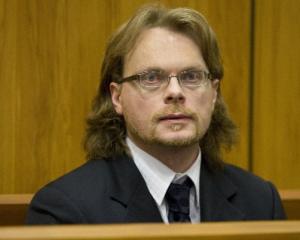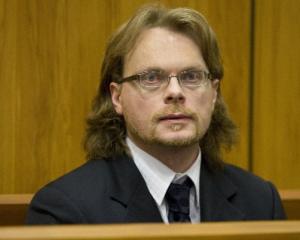It was "damned awful" being away from home for Clayton Weatherston's trial and it should have been possible to get 12 Otago jurors who were not "attached to the university", Lesley Elliott says.
She was commenting on the High Court decision by Justice Fogarty released this week about the transfer of the trial to the High Court at Christchurch, and arguments raised about the effect of University of Otago connections on potential Otago jurors.
Mrs Elliott's daughter Sophie had recently completed her studies at the University of Otago when she was murdered by Weatherston, a university tutor, at the Elliott family home in Ravensbourne in January 2008.
On Tuesday, Weatherston was sentenced to life imprisonment for the murder, with a non-parole period of 18 years.
Mrs Elliott said figures provided by Auckland University statistician Prof Chris Triggs to the transfer hearing suggested once those people with a university connection had been removed from the total pool of 83,000, Otago would still have had about 50,000 potential jurors.
She considered that a large enough number from which to draw a non-influenced jury.
"The law says you should be tried by a group of your peers."
Almost half of a potential Dunedin jury pool for the Weatherston trial could have had considerable sympathy for Sophie Elliott, Justice Fogarty said.
Justice Fogarty said when he first approached the application, he thought there would be no real difference between a Dunedin jury panel and one elsewhere in the country because the case had received nationwide publicity, diminishing reasons for moving the case.
However, the particular issue was that the defence would be the complex one of provocation.
He was satisfied there was a strong sense of community in the university which was likely to identify strongly with Miss Elliott's fate, and a broader community in Otago, particularly in Dunedin, of similar mind.
There was a practical difference between a jury from Otago and one from elsewhere.
"Given the nature of the provocation issue, it is in my view a significant practical difference, raising in my mind a real risk that the goals of securing a just process might be compromised."
As emphasis had to be given to securing a fair trial, little weight could be attached to the additional stress a distant trial placed on Miss Elliott's family.
Justice Fogarty referred to argument from Weatherston's counsel, Judith Ablett-Kerr, that Miss Elliott's death had generated an "enormous wave of sympathy" within the University of Otago community.
Mrs Ablett-Kerr had filed an affidavit from Prof Triggs showing the potential influence of the university community on the jury pool of 83,000.
This estimated about 28% of Dunedin's workforce was either directly employed by the University of Otago or derived some employment from the university's presence.
If this total of about 24,000 people were added to the people they came into close contact with, Prof Triggs argued there was a large pool of sympathy for Miss Elliott.
The Crown also supported the transfer application, counsel Marie Grills referring to coverage by the Otago Daily Times which had personalised "more than usually" the drama inherent in the case, Justice Fogarty said.
He cited the example of routine depositions reporting being accompanied by a photograph of Miss Elliott.
Mrs Ablett-Kerr had argued at one stage for the trial to be moved to the North Island, but at the time of the February hearing had agreed with the Crown view of its being transferred to Christchurch.
Attempts by the Otago Daily Times to get a copy of Prof Triggs' affidavit were unsuccessful yesterday.
Prof Triggs, who said he had prepared the affidavit for Mrs Ablett-Kerr and it was not part of other research, referred the Otago Daily Times to her office.
Mrs Ablett-Kerr's office advised she was not in a position to provide a copy of the affidavit and that no comment would be made on any other matters related to the case.
That included the cost of the affidavit's preparation.
The outcome of an application to the High Court for the release of the affidavit was not known yesterday.
Court transfer
Other cases heard in the High Court at Christchurch after transfer from Dunedin include the second trial of David Bain, acquitted in June of killing his family in Dunedin in 1994, and Colin Bouwer, found guilty in 2001 of murdering his wife Annette, who died in 2000, by poisoning.
He received life imprisonment and his non-parole period was extended from 13 years to 15 years by the Court of Appeal in 2002.
Earlier this month, it was announced the trial of Michael Swann for allegedly accepting a corrupt payment would be transferred to the High Court at Christchurch and is expected to be held in March next year.
The reasons for the transfer have been suppressed until the proceedings are complete.



